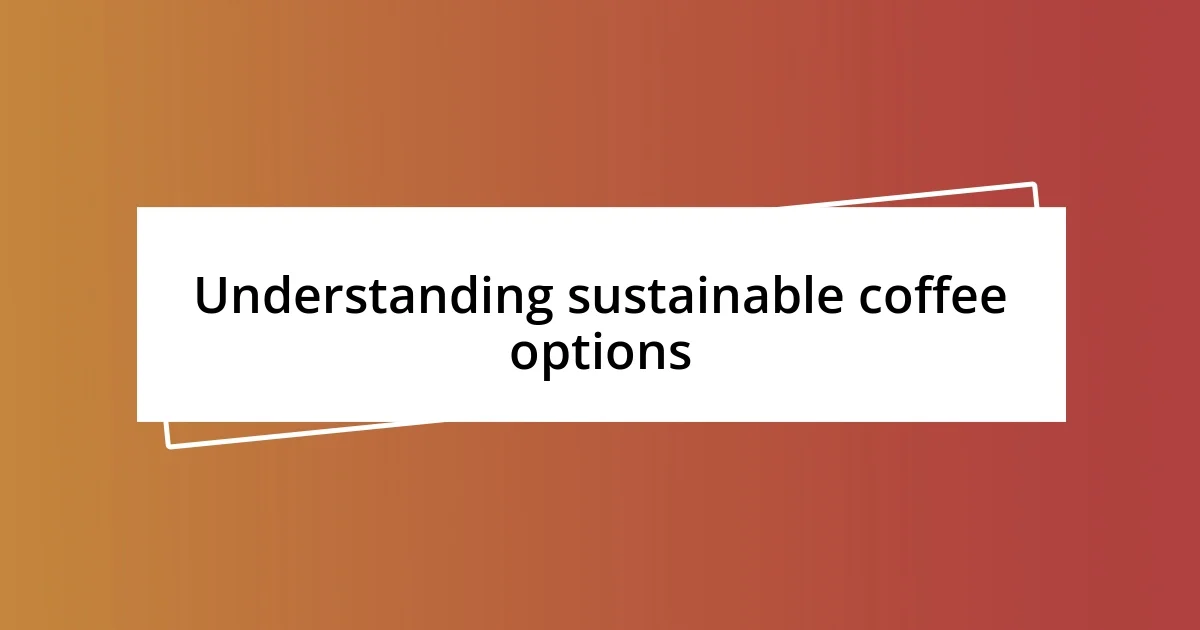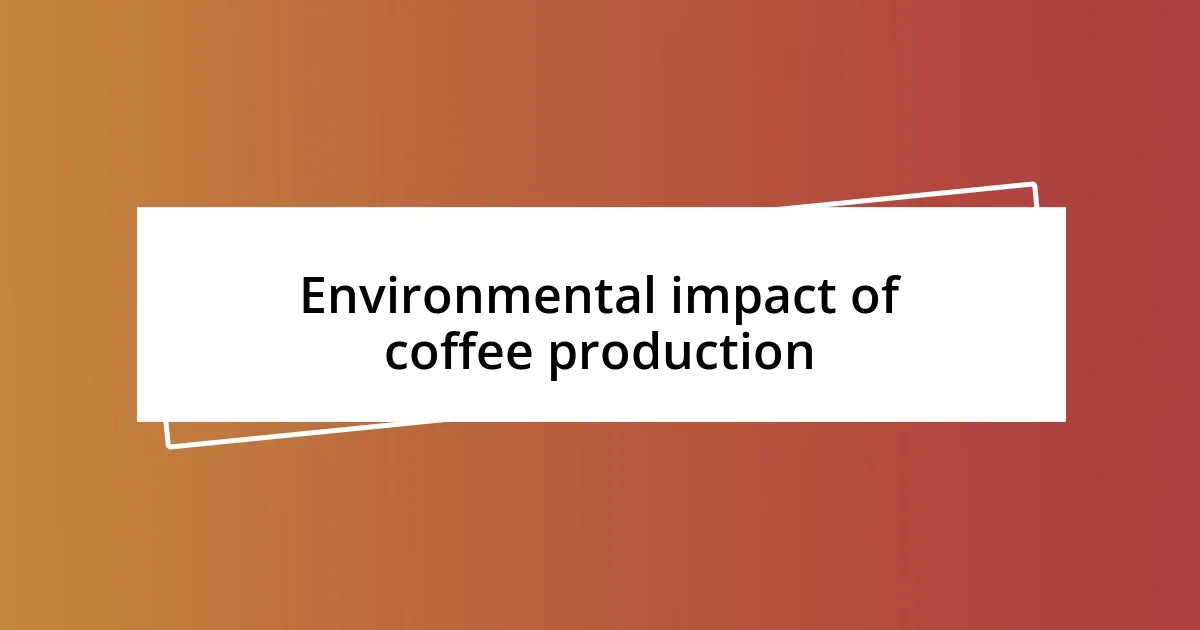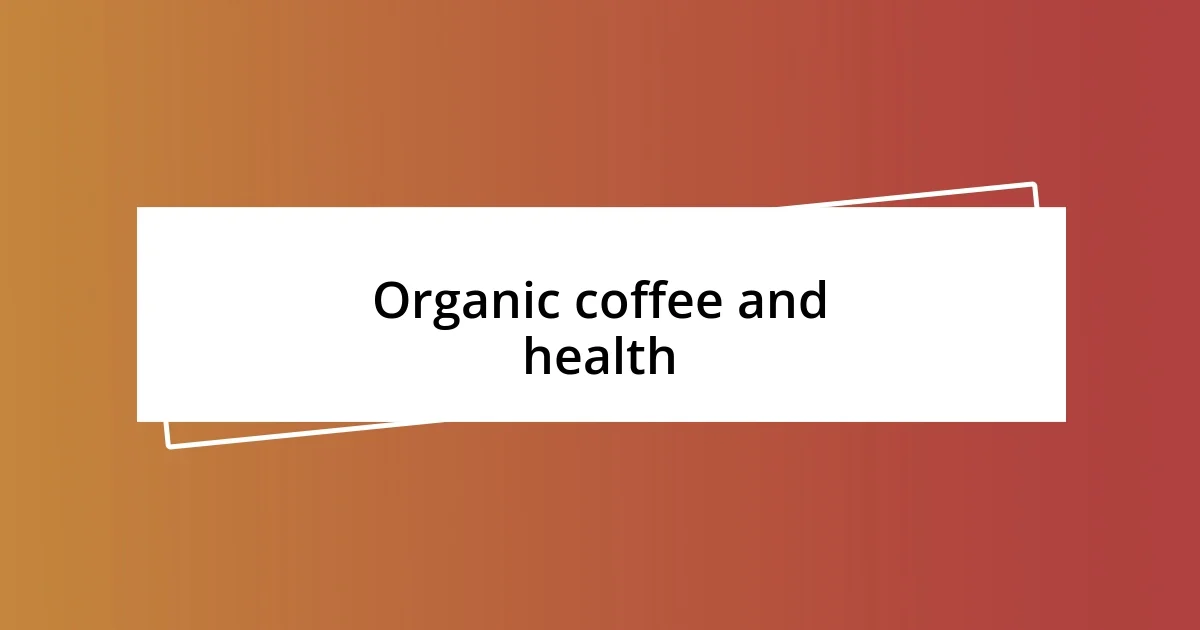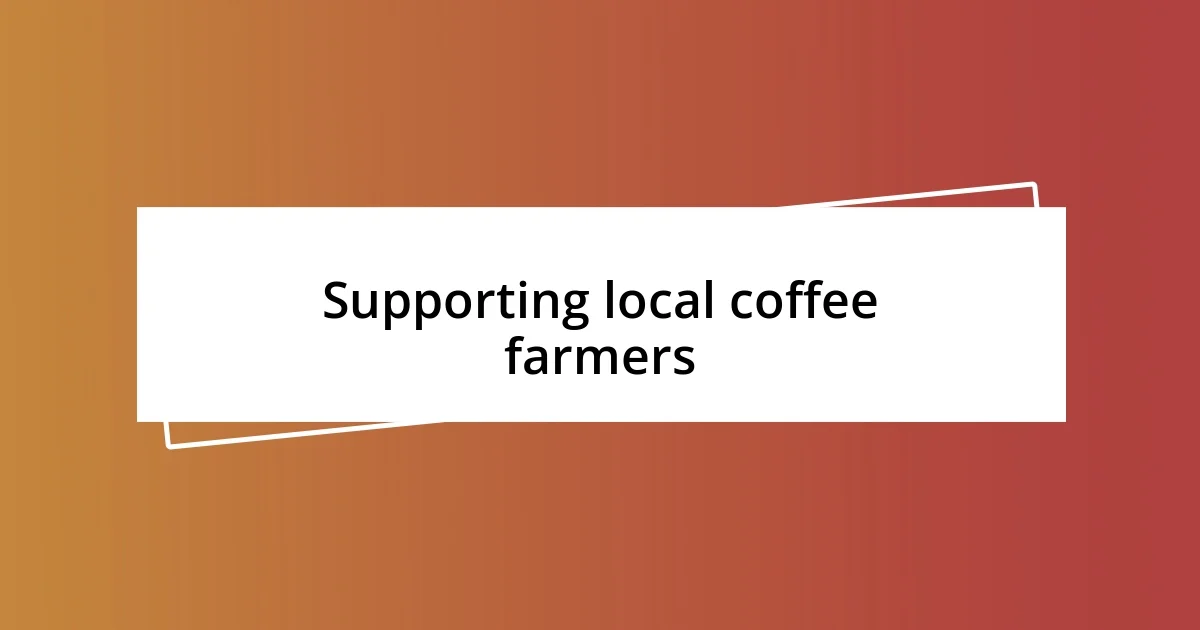Key takeaways:
- Understanding certifications like Fair Trade and Shade-Grown highlights the importance of ethical coffee sourcing, benefiting both farmers and the environment.
- Conventional coffee production poses significant environmental threats, including deforestation and water pollution, urging consumers to reconsider their coffee choices.
- Supporting local farmers not only promotes sustainable practices but also fosters a deeper connection between consumers and the origin of their coffee, amplifying the impact of each purchase.

Understanding sustainable coffee options
When I first delved into the world of sustainable coffee, I was surprised to discover the various certifications that indicate ethical practices. Fair Trade, for example, ensures that farmers receive fair compensation, while Shade-Grown coffee preserves biodiversity. Have you ever considered how your morning brew impacts farmers and the environment?
I remember visiting a local cafe that proudly served organic and direct trade coffee. It was an eye-opening experience to learn how the beans were sourced directly from farmers who prioritize sustainable farming practices. This connection made each sip feel more meaningful and connected me to the larger story behind my coffee. Isn’t it refreshing to know your caffeine fix supports a healthier planet?
Exploring sustainable options isn’t just about the beans; it’s about the entire journey they take to your cup. I’ve noticed that many brands now emphasize environmentally friendly packaging, which adds another layer of commitment to sustainability. This has made me rethink my choices—are we ready to demand more from the brands we love?

Environmental impact of coffee production
The environmental impact of coffee production is significant and often overlooked. I was shocked to learn that conventional coffee farming practices can lead to deforestation, soil degradation, and water pollution. These practices not only harm the ecosystems where coffee grows but also threaten the long-term viability of coffee production itself.
Here are some key ways coffee production affects the environment:
- Deforestation: Traditional coffee farming often involves clear-cutting forests, leading to biodiversity loss.
- Water Use: Coffee requires substantial water for irrigation, which can deplete local water sources.
- Pesticides and Chemicals: The heavy use of fertilizers and pesticides contaminates soil and water systems, harming wildlife and reducing soil fertility.
- Climate Change: Coffee farming contributes to greenhouse gas emissions, particularly through the energy-intensive processing methods used in production.
Understanding these impacts has made me more conscious of my coffee choices. During a recent trip to a coffee-growing region, I saw firsthand how shade-grown coffee farms not only preserve the forest but support local wildlife, creating a beautifully sustainable ecosystem. It’s experiences like this that truly underscore the importance of supporting environmentally responsible coffee producers.

Fair trade coffee benefits
Fair Trade coffee carries numerous benefits, primarily for farmers and their communities. When I learned that Fair Trade certification guarantees a minimum price to farmers, it truly opened my eyes to how this practice promotes economic stability. I remember the joy in a farmer’s eyes during a community meeting where they shared how Fair Trade helped them send their children to school and improve local healthcare. It was a poignant reminder that each cup I enjoy contributes directly to a family’s well-being.
Diving deeper into the ethical practices of Fair Trade, one aspect that resonated with me was the emphasis on sustainable farming methods. I vividly remember the first time I visited a Fair Trade coffee farm, where I saw practices that not only protect the land but also enhance the quality of the coffee. The farmers explained how they use organic techniques to keep their soil healthy and rich. This dedication not only nurtured their crops but also resonated with my desire to support eco-conscious choices.
One additional benefit I’ve come to appreciate is the impact on community development that Fair Trade fosters. I spoke with a cooperative leader who shared how their Fair Trade premiums funded clean water projects and training programs for women. Hearing how these initiatives transformed lives made me realize that my coffee choice was a small contribution to a larger movement of social change, bridging the gap between my daily pleasure and their empowerment.
| Benefit | Description |
|---|---|
| Fair Compensation | Ensures farmers receive a stable minimum price for their coffee, fostering economic security. |
| Sustainable Practices | Encourages organic and environmentally-friendly farming methods, benefiting the environment. |
| Community Development | Funds projects that enhance local infrastructure, education, and healthcare through Fair Trade premiums. |

Organic coffee and health
When it comes to organic coffee, I’ve found that it offers substantial health benefits compared to its conventional counterpart. For example, organic coffee is grown without synthetic fertilizers and pesticides, which means fewer chemicals are entering our bodies with each sip. I remember noticing a difference in my energy levels—I felt more alert without the jitteriness that sometimes accompanies non-organic brews.
Additionally, organic coffee often contains higher levels of antioxidants. These powerful compounds help fight free radicals in our bodies, which can contribute to various diseases. It’s fascinating how something as simple as a morning cup of coffee can potentially influence our health positively! I often wonder if this increased antioxidant content plays a role in my overall well-being since I rarely fall ill.
Furthermore, the commitment to organic farming often means that the coffee is harvested from improved, sustainable farming practices. When I visited a local roastery, I learned that many organic coffee growers take extra care in processing, which not only affects the flavor but also ensures higher quality beans. Isn’t it comforting to know that my coffee choice can be both a treat for myself and a healthier option? It’s a win-win that makes each cup taste all the better!

Exploring single origin coffees
Exploring single origin coffees has been one of the most exciting facets of my coffee journey. Each cup tells a unique story of its origin, from the lush volcanic soils of Ethiopia to the high-altitude farms of Colombia. I remember my first taste of an Ethiopian Yirgacheffe; the bright floral notes were so distinct, it felt like I was transported to the sun-drenched fields where the beans were grown.
What I find particularly fascinating is that single origin coffees allow me to connect with the farmers behind the beans. During a visit to a coffee cooperative, I met a farmer who passionately shared how the specific climate and terroir influence the flavor profiles of their coffee. Hearing him talk about the pride they take in their harvest made every sip feel more meaningful. Hasn’t anyone else felt a deeper appreciation for a product when you know the hands that nurtured it?
Additionally, single origin coffees often encourage sustainable agricultural practices. I’ve noticed that many farmers prioritize biodiversity and soil health to ensure the longevity of their crops. For instance, I once tasted a delightful Guatemalan coffee that had hints of chocolate and nuts, cultivated under the shade of native trees. This experience left me pondering the delicate balance between quality coffee and responsible farming. Don’t you think our coffee choices reflect our values and can even impact the planet?

Supporting local coffee farmers
Supporting local coffee farmers has profoundly shaped my perspective on coffee consumption. I vividly recall a visit to a community market, where I met a passionate local farmer who invited me to taste his freshly brewed coffee. The rich flavor and the heartfelt story behind each bean made my usual morning caffeine ritual feel more like a personal connection. Isn’t it empowering to know that your cup of coffee can support families right in your community?
Through my experiences, I’ve learned that purchasing from local farmers often means choosing fresher, higher-quality beans. I once participated in a tasting session featuring coffee from nearby farms, and I was amazed at the subtleties in flavor that varied from one batch to another. Each cup reflected not only the distinct terroir but also the dedication of the farmers who nurtured these beans. How can I not feel a sense of responsibility for the choices I make when they directly impact those farmers and their livelihoods?
Moreover, supporting local coffee farmers fosters sustainable practices that benefit the environment. I remember talking to a farmer who was deeply invested in preserving traditional growing methods, which not only sustains his family’s legacy but also enriches the ecosystem. This commitment to sustainable agriculture ignited a realization in me: every time I choose to buy local, I’m not just enjoying coffee; I’m part of a larger movement toward environmental stewardship. Doesn’t that make every sip just a little more special?














